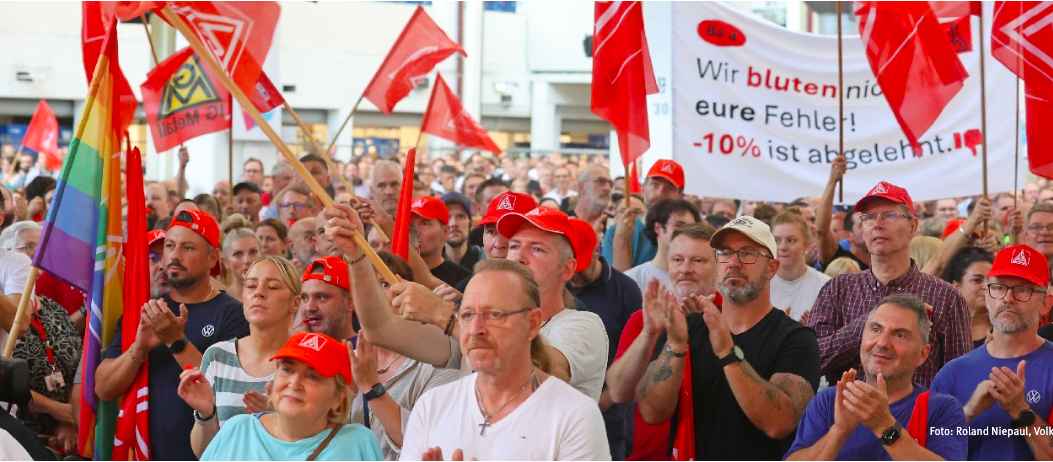
Published 10/29/2024 17:18 | Edited 10/29/2024 17:20
Volkswagen, one of the world’s largest car makers, is in the midst of an internal crisis, with controversial plans to close at least three factories in Germany and cut tens of thousands of jobs. The announcement, made by the head of the works council, Daniela Cavallo, this Monday (28), generated a strong reaction from unions and put the company’s management under pressure. The plans also include cuts in other units and possible salary reductions, affecting all of the company’s German factories.
Thomas Schäfer, CEO of Volkswagen, justified the cuts in a statement, highlighting that German factories are facing operating costs of 25% to 50% above forecast, making them twice as expensive as those of competitors. According to Schäfer, the situation requires “comprehensive measures” to regain competitiveness and achieve the target of a return on sales of 6.5% by 2026. Gunnar Kilian, the company’s human resources director, stated that, without these measures, Volkswagen will not be able to afford the necessary investments for the future, suggesting the urgent need for structural changes.
The company argues that rising costs, coupled with competition from low-cost Chinese electric cars, threaten its position in the European market and its ability to innovate. Last month, Volkswagen revealed that it is unlikely to reach its 10 billion euro savings target by 2026, a factor that also drove the decision to reassess the cost structure.
However, back in September, Daniela already denounced the reasons she considers plausible for the crisis: “Volkswagen is not suffering because of its locations in Germany and its personnel costs in Germany. “Volkswagen is suffering because the board is not doing its job.”
The company needs to regain technological leadership again. To achieve this, technical development must be strengthened rather than constantly postponing products and projects. For the metallurgical leader, this includes significant leaps forward in the area of software or the development of a competitive battery system: “We have to solve our obsession with rules, we have to put an end to our documentation madness and the many double and triple processes of security. And all of this is a leadership task!”, adds Daniela.
But instead of addressing the problems presented, managers, from VW finance chief Arno Antlitz to VW brand chief Thomas Schäfer to CEO Oliver Blume, want to make things easier for themselves, she said. They want to close locations and reduce employment. Daniela calls the administration’s historic plans to close factories for the first time “a declaration of poverty” and a “declaration of bankruptcy.”
She had already made it clear, before managers could take the microphone at the company meeting, that it was not the market that was too small, but that management was following the wrong strategy to sell more cars. She also blames management for underestimating the hybrid propulsion market. “Especially in difficult times, we need the courage to invest even in times of crisis and thus lay the foundations for tomorrow’s innovations.”
Reaction from workers and unions
The announcement was met with strong opposition from the works council and unions. Daniela Cavallo stated that “no factory is safe” and promised to resist the planned cuts. The IG Metall union leadership, through Thorsten Gröger, declared that the fight for jobs will be intense. “If the board wants to announce the end of Germany, they must expect resistance they cannot imagine,” said Gröger, warning of a direct confrontation if Volkswagen persists with closure plans.
Union dissatisfaction also manifests itself in salary negotiations. The next round is scheduled for Wednesday (30), and Volkswagen has already signaled salary cuts of 10%, with no increases expected for the next two years. In September, the company ended a job security agreement that had been in place for more than three decades, allowing layoffs from 2025. This rupture generated alarm among workers, who see the measure as a threat to long-term stability.
German government intervention
The repercussions of Volkswagen’s plans reached the German government. Chancellor Olaf Scholz, through a spokesman, expressed concern about the impact of these measures on jobs. The government emphasized that management decisions that may be “wrong” should not harm workers, highlighting the importance of protecting jobs in the automobile sector – a pillar of the German economy.
The government’s position reflects fears that the closure of Volkswagen factories could trigger a chain crisis in the German industrial sector. Volkswagen employs around 120,000 people in Germany, with ten factories spread across the country, including six in the state of Lower Saxony, where the company’s headquarters in Wolfsburg are located, employing approximately 60,000 workers.
Impact on the economy and the automotive sector
Volkswagen’s decision to close factories in Germany is a worrying sign for the national economy, which has faced challenges in maintaining its competitiveness. Rising operating costs, environmental pressures and the arrival of international electric car competitors are forcing strategic changes at German companies. Volkswagen’s announcement follows a trend of reviewing production structures that has also been observed in other large European companies in the automotive sector.
For Volkswagen, the cuts are seen as a necessary path to sustaining its leadership position and financing future innovations. However, this move is risky, as it could weaken the relationship with workers and affect the company’s image in the European market.
Perspectives and next steps
The situation between Volkswagen and the unions is still far from being resolved. Collective negotiations, which will resume soon, will represent a test of strength between management and workers. Cavallo criticized Volkswagen’s stance, stating that the company needs to present “viable concepts” for the future, instead of insisting on cuts and austerity measures.
For analysts, the challenge will be to find a balance between the need to reduce costs and maintain the trust of workers and the German government. The future of Volkswagen in Germany is at stake, and resolving this impasse could define the automaker’s direction in the midst of an automobile sector that is undergoing profound transformations.
With information from IG Metall and DPA agency
Source: vermelho.org.br

